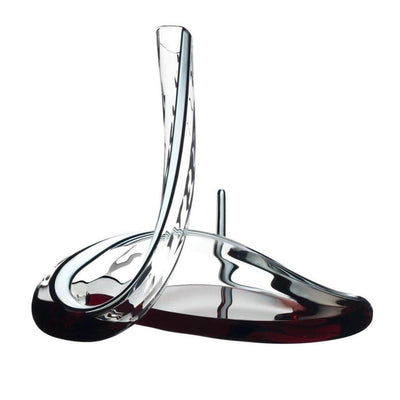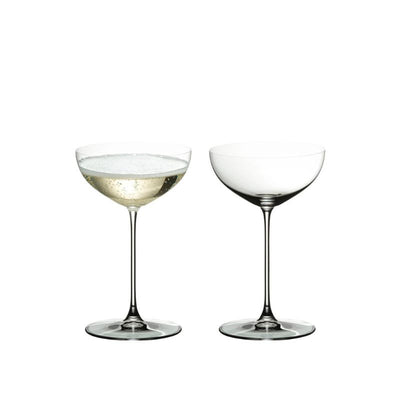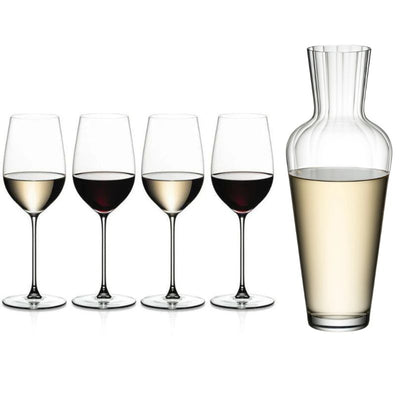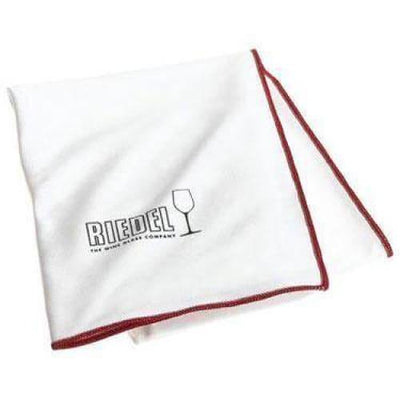The Psychology of Buying Good Glasses - Why We Agonise Over Wine Glasses More Than Holidays
There are some purchases you make without thinking. A takeaway because you can't face cooking. A bottle of Champagne on a Tuesday "just because." Even a new phone, because the camera promises to make your cat look marginally more photogenic.
But buying wine glasses? Suddenly you're Hamlet. To buy, or not to buy - that is the question.
It happened again last Wednesday. A customer on the phone with a pair of Vinum Burgundy glasses in her online basket, credit card in hand, obviously wrestling with herself. "Are they really worth it?" she asked for the third time. "I mean, we could just use the glasses I have..."
It wasn't about the £43.95. This woman had just spent ten minutes telling me about the anniversary trip to Burgundy she was planning, complete with vineyard tours and Michelin-starred restaurants. The holiday? No hesitation. But two wine glasses? Cue the existential crisis.
Why is it that spending £50 on a set of crystal glasses feels like a bigger decision than dropping the same on a Friday night curry? After 10 years selling, I've seen, and heard, this peculiar paralysis thousands of times.
And here's what's fascinating: it's almost never really about the money.
Why Buying Glasses Feels Different
Because glasses aren't just glasses. They're symbols. A saucepan lives in the cupboard; a wine glass lives in the spotlight. It's what your guests see first on the table, what you cradle when you tell stories, what you raise in a toast. Buying proper stemware feels less like ticking off a household item and more like saying: I take wine - and maybe even myself - seriously now.
There's fragility, too. A saucepan won't shatter if you look at it the wrong way. Crystal might. When you buy a nice pair of shoes or a good bottle of wine, you know roughly how long it'll last. But glasses? One moment of clumsiness, one enthusiastic dinner guest, one slip in the dishwasher, and your investment becomes a dustpan full of regret. But that's where our "Half-price replacement for accidental damage" guarantee kicks in!
Research on consumer behaviour shows that purchases requiring high investment but carrying significant risk are particularly likely to trigger what psychologists call cognitive dissonance - that uncomfortable feeling that maybe you've made a terrible mistake.
You're not buying a thing that will definitely last. You're buying a thing that you might smash against the mixer tap tomorrow (personal experience speaking there). That's a tough sell when you're the one trying to convince yourself.
And then there's the visibility factor. Good glasses make a statement. Will people think you're showing off? Pretentious? Trying too hard? Research into luxury consumption has found that luxury purchases can trigger feelings of shame and guilt even among affluent consumers, partly because we worry about being judged as wasteful or self-indulgent.
No wonder my customer was still hesitating, credit card hovering.
The Gift Loophole
Here's something I've noticed: people have absolutely no problem buying good glasses as gifts. "Oh, these are for my daughter's new flat," they say confidently, selecting the Veritas set without a moment's hesitation. For a wedding present? Easy decision. Housewarming? Done and dusted in five minutes.
But for themselves? That's when the mental gymnastics begin.
There's actually science behind this. Consumer psychologists have found that people who give gifts with altruistic motivation - genuinely wanting to make someone happy - are more likely to then self-indulge in affordable luxury items afterward. It's as if the act of giving creates permission to receive.
We need to earn the right to treat ourselves, apparently, but we can freely treat others.
I've had customers who've admitted they bought glasses "as a gift" and then kept them. The glasses were always for them (probably). They just needed the story to get past their own psychological barriers.
The Agony Before, the Joy After
The strange thing is, all the agonising happens before the purchase. You circle them online like a long-distance crush, imagining how they'd look on your table. You picture yourself swirling a Pinot Noir like someone in a glossy Netflix drama. Then you close the tab with a guilty sigh of "maybe next month."
The Breakability Anxiety Spiral
Let me walk you through what I call the Breakability Anxiety Spiral:
"These are beautiful glasses. But what if I break one? Then I'll have an odd number. Should I buy an extra? But what if I break two? Maybe I should just stick with cheap glasses that I won't worry about. But then what's the point of buying good wine? Although actually, can I even taste the difference? Maybe I'm not sophisticated enough for these glasses. Am I pretending to be someone I'm not?"
And so on, until they've talked themselves out of something they genuinely wanted.
But the minute you finally commit, the mood flips. That first pour feels different. Your wine tastes different. Suddenly a Thursday night Rioja has the gravitas of a Saturday night dinner party.
Nobody ever says, "I regret buying those glasses."
The only regret is not doing it sooner.
The Real Question (That Nobody's Asking)
After watching this dance play out approximately ten thousand times, I've realized that "Are these glasses worth it?" is almost never the actual question.
The real question is: "Am I worth it?"
Research on self-gifting luxury goods has found something fascinating: although self-oriented benefits might trigger the initial desire to buy something nice, the decision to actually purchase explicitly luxury brands for oneself is often influenced by concerns about how others will perceive the purchase. Even when we're buying something for ourselves, in private, to use in our own homes, we're worried about an imaginary audience judging our choices.
Are you the sort of person who deserves hand-blown crystal? Are you sophisticated enough? Successful enough? Careful enough not to break them?
There's something unbearably sad about talking to a customer who's earning a good living, appreciating good wine, perfectly able to afford a set of glasses that will enhance something they do several times a week... and they're secretly paralysed by whether they've earned the right to own them.
The glasses aren't the issue. Self-worth is the issue. So, this is a bit of therapy with a side of stemware.
Reframing the Purchase
Stop thinking of glasses as "things you might break" and start thinking of them as "tools for joy." The wine is the same - but in the right glass, it opens up, it sings, it feels special. Just like good headphones make your favourite song sound fresh, or a good mattress transforms sleep, good glasses elevate the everyday.
The Cost-Per-Use Calculation
Here's a calculation that sometimes helps: if you use a pair of glasses three times a week for three years, that's roughly 9 pence per use, for a pair of Vinum glasses. Or 28 pence per week. Less than a loaf of bread a month. For something that makes every sip of wine taste markedly better.
And if you break them? You'll survive. Most people don't break them anyway. The mental spiral of "what ifs" is almost always worse than reality (and not just when it's about wine glasses).
Permission Granted
Look, I sell expensive glasses for a living, so you might think I'm just trying to overcome your objections to make a sale. But here's the truth: I'd much rather you buy a modest set of glasses you'll use constantly than an expensive set you'll use nervously.
The point isn't the glasses. The point is the ritual, the pleasure, the moment at the end of the day when you pour something delicious and take a breath.
That's worth investing in. You're worth investing in.
Not because you've achieved some arbitrary level of success or sophistication. Not because you've "earned" it through suffering or accomplishment. Just because you're a human being who enjoys wine, and life is short, and there's no prize for drinking beautiful wine from mediocre glasses.
My customer last week? She bought the glasses. I heard the relief flood her voice once the decision was made. "Right," she said, suddenly brisk. "Done. And if I break them, I'll buy them again."
Now that's the attitude, and also the point I reminded her of our "Half-price replacement for accidental damage" guarantee!
Just promise me one thing: when they arrive, use them that same week. Don't wait for a special occasion. Don't save them for guests. Pour yourself something lovely, sit down, and enjoy the fact that you made a choice that enhances your daily life.
And if you break one?
Well, that's what I'm here for.
























Leave a comment